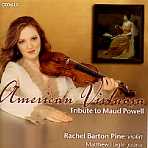Back in the late-’50s/early-’60s, my violin teacher sent me home after each week’s lesson with a handful of LPs–recordings of famous violin pieces, transcriptions, and arrangements performed by the world’s greatest violinists–Heifetz, Stern, Milstein, Menuhin–which (as she knew they would) never failed to inspire a young student to practice, practice, practice. After all, how could you resist wanting to work as hard as it took to be able to play such magical musical gems as well as the masters–to make your own instrument sound those beautiful melodies, your bow skip over the strings with such ease, and your tone charm all who would listen with its vibrant resonance?
With this new release, violinist Rachel Barton Pine and Cedille recall the glorious era of the headline-inducing violin recital, the art of the arrangement and transcription, and the thrill of virtuoso performance for its own sake. And yes, Pine’s choice of music and her brilliant playing could serve as inspiration to a new generation of prospective string players, just as those by the old masters did during the days of the LP.
Pine’s own focus and inspiration come from Maud Powell (1867-1920), the “first great American violinist”, who not only was a phenomenal performer and accomplished transcriber/arranger, but who in her pioneering recitals also was a champion of new works by American composers, including African Americans and women. Pine has already proven her formidable technical and interpretive skills–in Bach, Brahms, Joachim, and Bruch, among many others; here she treats us to 18 works from the 19th and 20th centuries, most of which were either dedicated to or arranged by Powell. From Amy Beach’s gorgeous Romance to Dvorák’s Humoreske, Sibelius’ “Musette” from King Christian II, Carl Venth’s Aria, and Cecil Burleigh’s Four Rocky Mountain Sketches, Pine and her very able piano partner Matthew Hagle treat us to a true celebration of the violin in its several guises–as singer, percussionist, poet, and even humorist.
There are beautiful melodies everywhere–the kind that musicians used to unashamedly perform both in parlors and on concert stages–and there are also purely entertaining novelties and virtuoso show-off pieces, from Chopin’s “Minute” Waltz to Herman Bellstedt’s dazzling Caprice on Dixie for Unaccompanied Violin. Two of the disc’s highlights are spirituals arranged by Powell–Deep River and Nobody Knows the Trouble I See–the latter of which Pine smartly chose to quietly, reverently end her recital.
Pine revels in every double-stop passage and soaring melody, takes full advantage of opportunities to “dig in” or softly float; she shows her sensitive side in the muted harmonics of Massenet’s Twilight and in one exquisite section of Max Liebling’s Fantasia on Sousa Themes. In fact, she never leaves any doubt that she’s having a great time with this music (listen to the surprising “Stars and Stripes Forever” conclusion to the Liebling!), or that she truly respects and is inspired by “the art of one of the greatest violinists ever.” The sound is unfailingly vibrant and ideally balanced between violin and piano (not always an easy feat), allowing Pine’s 1742 Guarneri violin to freely express itself. Highly recommended! [7/17/2007]
































